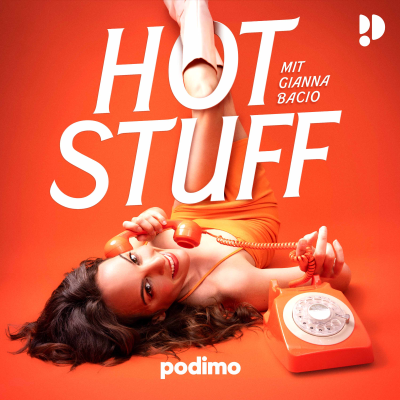
The Cinephiliacs
Englisch
Gratis en Podimo
Kostenlos hören bei Podimo
Starte jetzt und verbinde dich mit deinen Lieblingspodcaster*innen
- Vertraut von über 1 Mio. deutschen Hörer*innen
- Über 1.000 lokale Podcasts und Shows – nur bei Podimo
- Keine Zahlung nötig
Mehr The Cinephiliacs
The Cinephiliacs is a podcast exploring the past and future of cinephelia. Film critic Peter Labuza has interviewed critics, programmers, academics, filmmakers, and more about their relationship to film and film culture. Additionally, each guest will bring in a particular favorite film and discuss it with Labuza. Indiewire declares, "If you want to hear film critics talk at length about their craft, there are few better places on the Internet" and Keyframe Daily has called it "Exhibit A" for the future of film culture
Alle Folgen
175 FolgenFraming Media #8 - Jennifer Peterson on Goverment Sponsored Environmental Awareness Films
Today's episode features Jennifer Peterson, Professor and Chair of the Department of Communication at Woodbury University and author ofEducation in the School of Dreams: Travelogues and Early Nonfiction Film [https://www.blogger.com/blog/post/edit/3668811716196290601/261612074393505825]. We discuss her article for the "Medicine on Screen" program for the National Library of Medicine entitled "Darkening Day: Air Pollution Films and Environmental Awareness, 1960–1972 [https://www.blogger.com/blog/post/edit/3668811716196290601/261612074393505825]." Peterson examines a select series of films from the postwar era, all sponsored by the United States government, that tackled growing concerns about air pollution and other environmental concerns in a world before the Environmental Protection Agency. The two look at unique aspects that make these films shocking today, not just for their strong anti-corporate advocacy but often their aesthetic qualities that reflected the experimental films of the era. But Peterson also acknowledges the limitations they held to advocate for positions by turning away from mass mobilization or community organizing by putting trust in the government, a position hard to rationalize in today's continuing climate emergency.
Framing Media #7 - Anne Kaun on Prison Media Work
Today's episode features Anne Kaun, as Associate Professors at Södertörn University in the Department of Culture and Education, co-editor ofMaking Time for Digital Lives [https://www.blogger.com/blog/post/edit/3668811716196290601/1874278602857696131], and the author ofCrisis and Critique: A Brief History of Media Participation in Times of Crisis [https://www.blogger.com/blog/post/edit/3668811716196290601/1874278602857696131]. We discuss her co-authored article with Fredrik Stiernstedt entitled “Prison Media Work: From Manual Labor to the Work of Being Tracked [https://www.blogger.com/blog/post/edit/3668811716196290601/1874278602857696131],” fromMedia, Culture & Society. We discuss both the historical and global trends in the relationship between prison work and media infrastructures. Anne examines both the traditions of prison labor in building media as part of ,rehabilitation and professionalization, but also how it has evolved under neoliberal transformations to no longer reflect these goals. Most pointedly, she takes us through the new role of work for prisoners: acting as subjects for data analysis by large private companies looking to strengthen their algorithmic computation. Prisoners no longer do media work themselves as much as are a subject of being worked upon by media. In bringing light to this history, Kaun brings light to the complex network we live in that in many ways is shaped by prisons and the incarcerated without our knowledge.
Framing Media #6 - Christina Lane on Producer Joan Harrison, The Mistress of Suspense
Today's episode features Christina Lane, an Associate Professor of film studies and chair of the cinema department at the University of Miami and author ofFeminist Hollywood: From Born in Flames to Point Break and Magnolia [https://www.blogger.com/blog/post/edit/3668811716196290601/6641534211032969344]. We discuss her new book,Phantom Lady: Hollywood Producer Joan Harrison, The Forgotten Woman Behind Hitchcock [https://www.blogger.com/blog/post/edit/3668811716196290601/6641534211032969344], which narrates the oft-forgotten tale of one of the studio era's most notable female pioneers. As Lane explores, Harrison played a multi-faceted role in the 1930s and early 1940s for director Alfred Hitchcock that cannot be understated, and then went on to become one of the "girl producers" of the 1940s with fascinating noirish thrillers likePhantom Lady, Dark Waters,andRide the Pink Horse. Through it all, Lane relishes in the details of the nimble yet prodigious navigator of the studio system, and in particular, her unique transition to television and central role as a proto-showrunner onAlfred Hitchcock Presents. As Lane suggests, Harrison was much more than a "gal Friday," and instead someone who balanced personal toil, political scrutiny, and of course, the misogyny of Hollywood—rarely receiving the credit due to her talents, and offering inspiration for us all today.
Framing Media #5 - Chris Yogerst on the 1941 Senate Investigations into Pro-War Hollywood
Today's episode features Christopher Yogerst, an assistant professor of communication, at the University of Wisconsin, Milwaukee and the author ofFrom the Headlines to Hollywood: The Birth and Boom of Warner Bros [https://www.blogger.com/blog/post/edit/3668811716196290601/5148228580408833119]. We discuss his new book,Hollywood Hates Hitler!: Jew-Baiting, Anti-Nazism, and the Senate Investigation into Warmongering in Motion Pictures, [https://www.blogger.com/blog/post/edit/3668811716196290601/5148228580408833119]a fascinating look into the 1941 hearings in Congress over Hollywood's role in American life. Yogerst contextualizes an oft-forgotten event in the shadow of World War II, where isolationist Senators (many connected with the anti-Semitic America First Committee) attempted to argue a conspiracy against the film industry for making what they suggested was pro-war propaganda. As Yogerst details, the hearings revealed the follies of the Senate to actually understand the film industry, and highlighted the changing nature of the role of movies within the public. The result is a fascinating telling that would foretell the events that would soon grapple the industry—particularly the HUAC Investigations and the antitrust litigation—and has resonance for the continued role of Congress in its attempts to take on industries in Silicon Valley.
Framing Media #4 - Hayley O'Malley on Kathleen Collins
Today's episode features Hayley O'Malley, a Mellon postdoctoral fellow for the Black Arts Archive Sawyer Seminar at Northwestern University, who researches black women’s art and activism. We discuss her article, "Art on Her Mind: The Making of Kathleen Collins's Cinema of Interiority [https://www.blogger.com/blog/post/edit/3668811716196290601/7518715697566991002],” published inBlack Camera. O'Malley looks across the broad spectrum of work, much of it unpublished, by the director ofLosing Ground to find an artist continually using a subjective voice to define identity beyond the grounds of race and gender. Searching through her archives, she argues for a broader understanding of Collins as a writer in search of authentic experiences and attempting to tell personal stories without necessarily falling simply into autobiography. The research thus demonstrates a better understanding of this recently rediscovered filmmaker not just as a curios side note for film history, but perhaps a defining thinker and writer who influenced a number of writers, directors, and other artists in ways we might not realize.















































![Kiss me once [Kiss the Bodyguard-Reihe, Band 1 (Ungekürzt)]](https://cdn.podimo.com/images/90dee68e-9f1b-4723-9f8c-92ee2a3c5cf0_400x400.png)